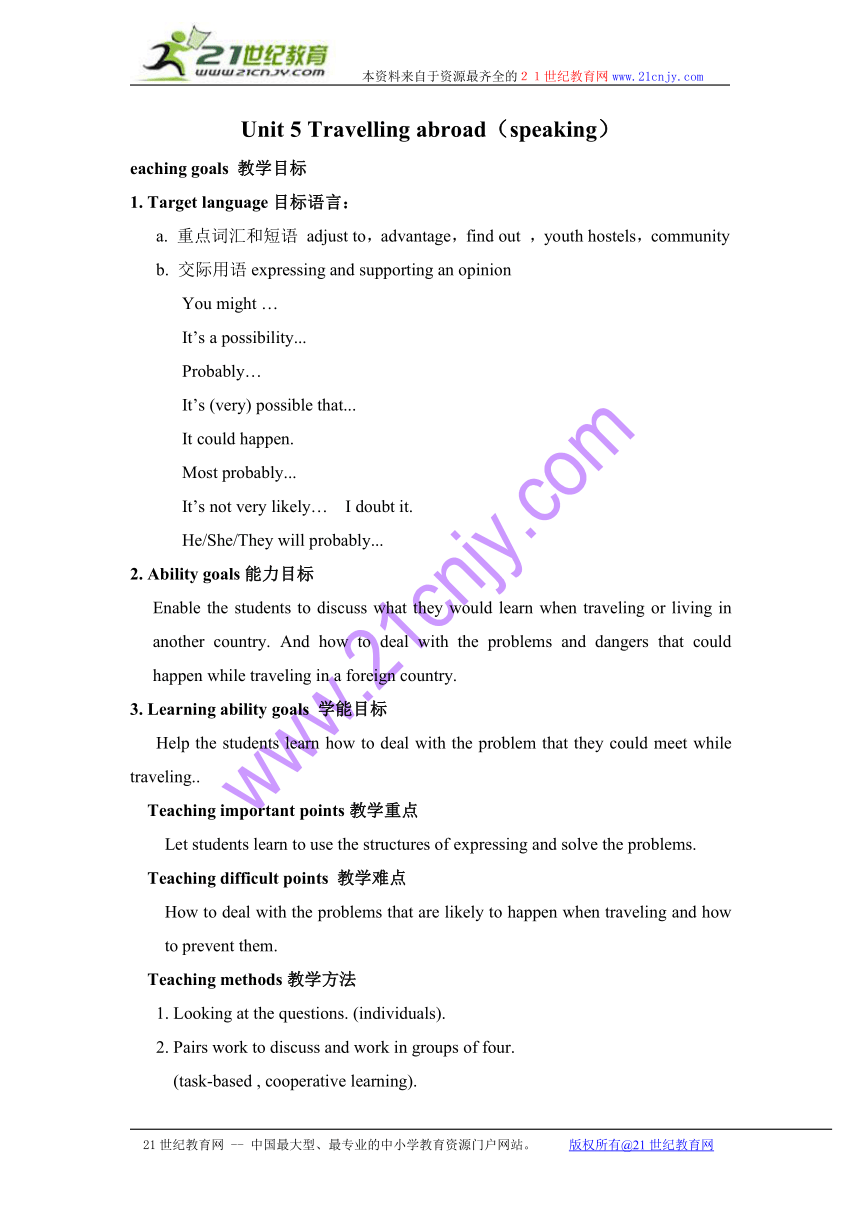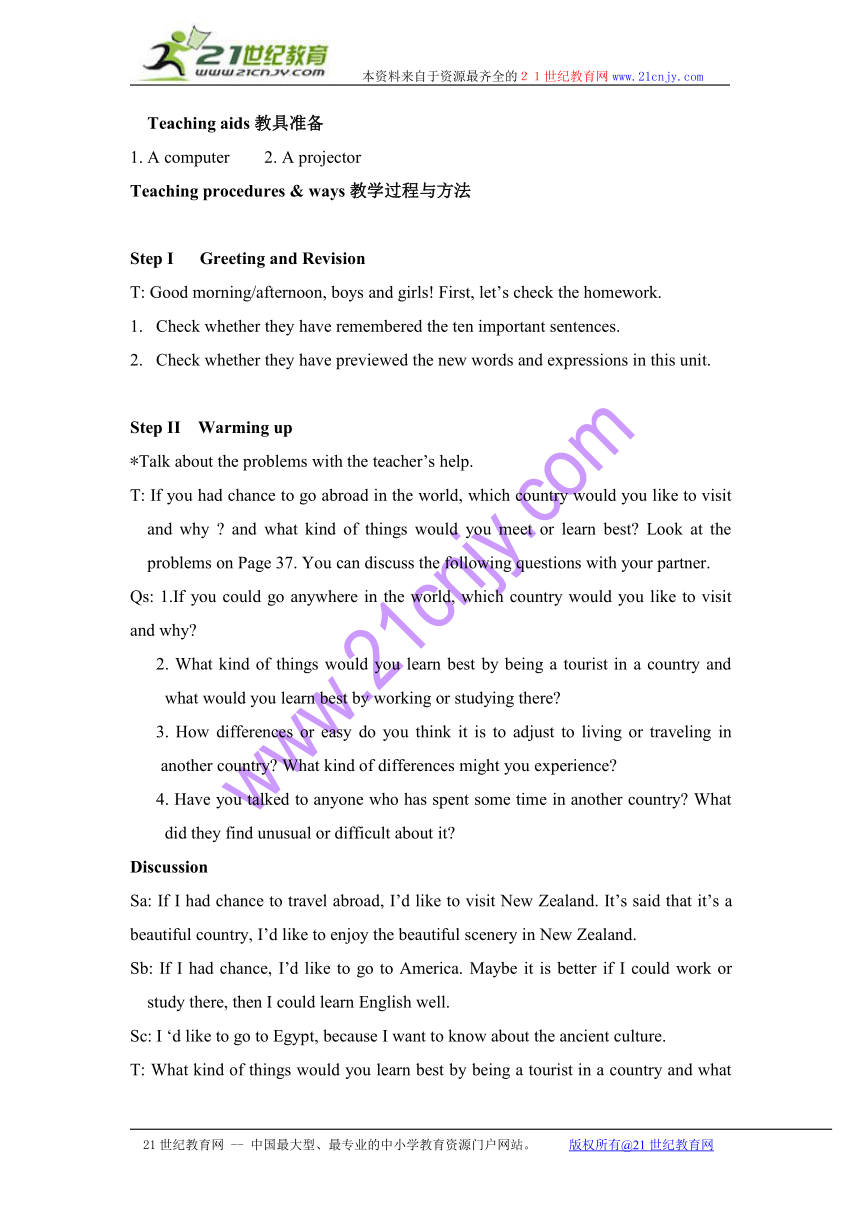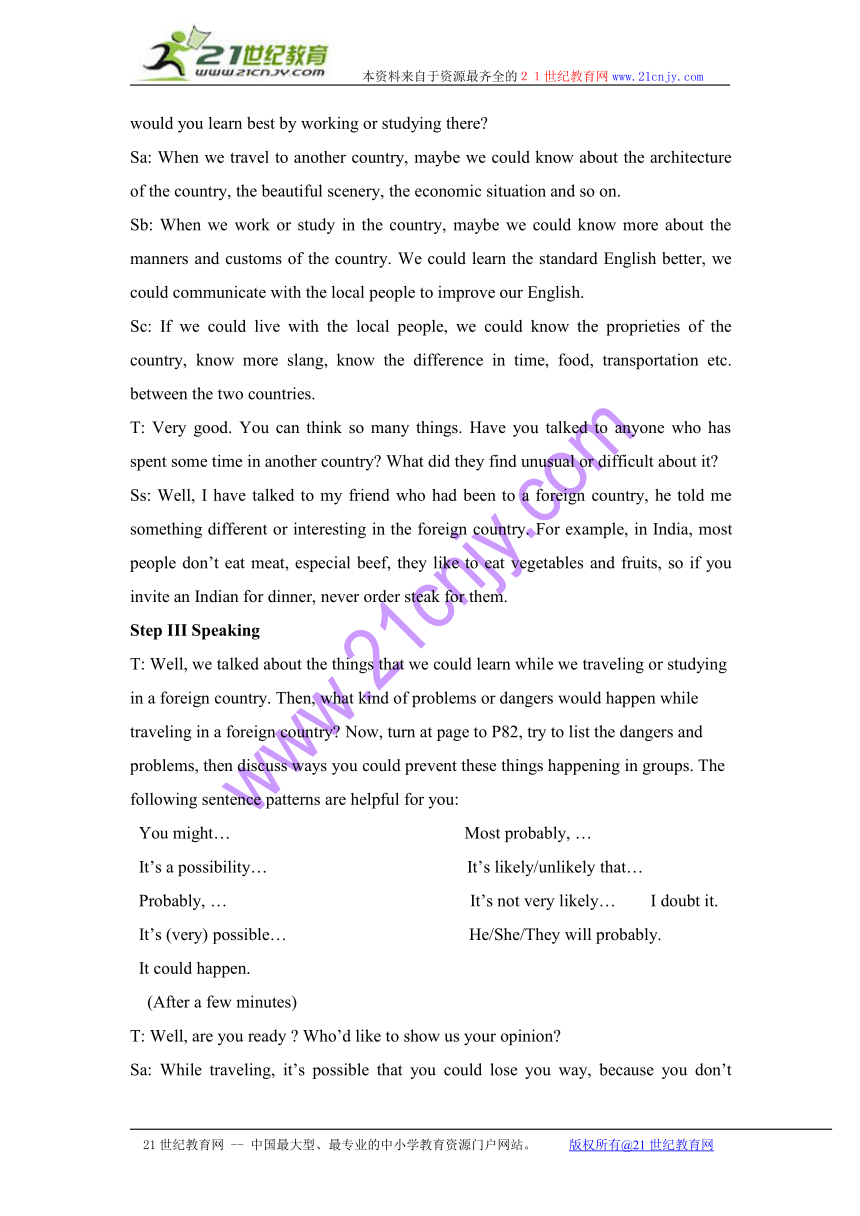Unit 5 Travelling abroad 教案-speaking(新人教选修7)
文档属性
| 名称 | Unit 5 Travelling abroad 教案-speaking(新人教选修7) |  | |
| 格式 | rar | ||
| 文件大小 | 35.7KB | ||
| 资源类型 | 教案 | ||
| 版本资源 | 人教版(新课程标准) | ||
| 科目 | 英语 | ||
| 更新时间 | 2009-07-16 12:54:00 | ||
图片预览



文档简介
本资料来自于资源最齐全的21世纪教育网www.21cnjy.com
Unit 5 Travelling abroad(speaking)
eaching goals 教学目标
1. Target language目标语言:
a. 重点词汇和短语 adjust to,advantage,find out ,youth hostels,community
b. 交际用语expressing and supporting an opinion
You might …
It’s a possibility...
Probably…
It’s (very) possible that...
It could happen.
Most probably...
It’s not very likely… I doubt it.
He/She/They will probably...
2. Ability goals能力目标
Enable the students to discuss what they would learn when traveling or living in another country. And how to deal with the problems and dangers that could happen while traveling in a foreign country.
3. Learning ability goals 学能目标
Help the students learn how to deal with the problem that they could meet while traveling..
Teaching important points教学重点
Let students learn to use the structures of expressing and solve the problems.
Teaching difficult points 教学难点
How to deal with the problems that are likely to happen when traveling and how to prevent them.
Teaching methods教学方法
1. Looking at the questions. (individuals).
2. Pairs work to discuss and work in groups of four.
(task-based , cooperative learning).
Teaching aids教具准备
1. A computer 2. A projector
Teaching procedures & ways教学过程与方法
Step I Greeting and Revision
T: Good morning/afternoon, boys and girls! First, let’s check the homework.
1. Check whether they have remembered the ten important sentences.
2. Check whether they have previewed the new words and expressions in this unit.
Step II Warming up
*Talk about the problems with the teacher’s help.
T: If you had chance to go abroad in the world, which country would you like to visit and why and what kind of things would you meet or learn best Look at the problems on Page 37. You can discuss the following questions with your partner.
Qs: 1.If you could go anywhere in the world, which country would you like to visit and why
2. What kind of things would you learn best by being a tourist in a country and what would you learn best by working or studying there
3. How differences or easy do you think it is to adjust to living or traveling in another country What kind of differences might you experience
4. Have you talked to anyone who has spent some time in another country What did they find unusual or difficult about it
Discussion
Sa: If I had chance to travel abroad, I’d like to visit New Zealand. It’s said that it’s a beautiful country, I’d like to enjoy the beautiful scenery in New Zealand.
Sb: If I had chance, I’d like to go to America. Maybe it is better if I could work or study there, then I could learn English well.
Sc: I ‘d like to go to Egypt, because I want to know about the ancient culture.
T: What kind of things would you learn best by being a tourist in a country and what would you learn best by working or studying there
Sa: When we travel to another country, maybe we could know about the architecture of the country, the beautiful scenery, the economic situation and so on.
Sb: When we work or study in the country, maybe we could know more about the manners and customs of the country. We could learn the standard English better, we could communicate with the local people to improve our English.
Sc: If we could live with the local people, we could know the proprieties of the country, know more slang, know the difference in time, food, transportation etc. between the two countries.
T: Very good. You can think so many things. Have you talked to anyone who has spent some time in another country What did they find unusual or difficult about it
Ss: Well, I have talked to my friend who had been to a foreign country, he told me something different or interesting in the foreign country. For example, in India, most people don’t eat meat, especial beef, they like to eat vegetables and fruits, so if you invite an Indian for dinner, never order steak for them.
Step III Speaking
T: Well, we talked about the things that we could learn while we traveling or studying in a foreign country. Then, what kind of problems or dangers would happen while traveling in a foreign country Now, turn at page to P82, try to list the dangers and problems, then discuss ways you could prevent these things happening in groups. The following sentence patterns are helpful for you:
You might… Most probably, …
It’s a possibility… It’s likely/unlikely that…
Probably, … It’s not very likely… I doubt it.
It’s (very) possible… He/She/They will probably.
It could happen.
(After a few minutes)
T: Well, are you ready Who’d like to show us your opinion
Sa: While traveling, it’s possible that you could lose you way, because you don’t know the country very well. To prevent this:
◆ You’d better take a map of the country with you.
◆ Don’t leave alone without saying a word.
◆ Pay attention to the conspicuous signs, for example, some famous buildings, some special road signs so that you can ask the way while you are lost.
Sb: It’s likely that we could meet malefactors--- robber, thief or others. Probably, we will be hurt. To prevent this:
◆ Don’t show your valuable belongings to others.
◆ You’d better go along with other people.
◆ Should you face dangers, connect the police.
Sc: It’s (very) possible that we could have difficulty in communicating with the local people. To prevent this:
◆ Try to grasp the simple and basic communicated language
◆ Try to know about the manners and customs of the country
◆ Try to be familiar with formality in everyday life
Step IV Talking (若时间不足,可改为作业)
T: OK! So much for the questions. You did a very good job, I’m sure that you have known how to deal with the problems while traveling or studying in a foreign country. If we wanted travel alone with a little money, could you find a good way to save money
Sa: Maybe we could travel on foot or by second-class rail.
Sb: We could stay at the small inn to save money, but maybe the situation there is not good.
T: Well, there is a good and not expensive place for travellers--- Youth Hostels, Hostels provide clean safe place to stay and have community kitchens. Now, let’s read something about Youth Hostels and discuss the questions in groups.
(5 minutes later.)
T: OK. Let’s look at the questions. Are youth hostels expensive or cheap to stay in
Ss: They are cheap. They offer quality accommodation at low cost.
T: Yes. And how many people share a bedroom in a hostel
Ss: There are 4,5, or 6 people.
T: What is the advantage of staying in a place with a kitchen when you are traveling
Ss: If there were a kitchen in the hostel, I could cook by myself, it’s It is good economy to cook on my own.
T: What is the advantage of having a Youthpass
Ss: Youthpass offers travelers cheap train fares in most European countries. It can make you maximize your time and minimize your cost.
T: How old must you be to get a Youthpass
Ss: For those under age 26 on their first day of travel.
T: Why is it a good idea to buy travel insurance
Ss: Because while traveling, we may face unexpected illness or accident, no matter where you go to in the world, the cost of medical treatment can be very high, if you buy travel insurance, it can afford all medical treatment of you while traveling abroad.
T: Then would you enjoy staying in a youth hostel Why
Ss: Though there are many advantages of staying in a youth hostel, I still like to travel in collective tour. Tourists can help each other in case of an emergency.
Ss: Well, I like youth hostel very much. Because I like traveling on my own, I like to enjoy the sense of freedom, I can do whatever I like. Also, it’s convenient for traveler to stay in youth hostel.
T: Good. There is little time, let’s look at our homework.
Step V Homework
1.Learn the new words and expressions by heart
2.Let students talk about their experiences of travelling
21世纪教育网
高考资源网
21世纪教育网 -- 中国最大型、最专业的中小学教育资源门户网站。 版权所有@21世纪教育网
Unit 5 Travelling abroad(speaking)
eaching goals 教学目标
1. Target language目标语言:
a. 重点词汇和短语 adjust to,advantage,find out ,youth hostels,community
b. 交际用语expressing and supporting an opinion
You might …
It’s a possibility...
Probably…
It’s (very) possible that...
It could happen.
Most probably...
It’s not very likely… I doubt it.
He/She/They will probably...
2. Ability goals能力目标
Enable the students to discuss what they would learn when traveling or living in another country. And how to deal with the problems and dangers that could happen while traveling in a foreign country.
3. Learning ability goals 学能目标
Help the students learn how to deal with the problem that they could meet while traveling..
Teaching important points教学重点
Let students learn to use the structures of expressing and solve the problems.
Teaching difficult points 教学难点
How to deal with the problems that are likely to happen when traveling and how to prevent them.
Teaching methods教学方法
1. Looking at the questions. (individuals).
2. Pairs work to discuss and work in groups of four.
(task-based , cooperative learning).
Teaching aids教具准备
1. A computer 2. A projector
Teaching procedures & ways教学过程与方法
Step I Greeting and Revision
T: Good morning/afternoon, boys and girls! First, let’s check the homework.
1. Check whether they have remembered the ten important sentences.
2. Check whether they have previewed the new words and expressions in this unit.
Step II Warming up
*Talk about the problems with the teacher’s help.
T: If you had chance to go abroad in the world, which country would you like to visit and why and what kind of things would you meet or learn best Look at the problems on Page 37. You can discuss the following questions with your partner.
Qs: 1.If you could go anywhere in the world, which country would you like to visit and why
2. What kind of things would you learn best by being a tourist in a country and what would you learn best by working or studying there
3. How differences or easy do you think it is to adjust to living or traveling in another country What kind of differences might you experience
4. Have you talked to anyone who has spent some time in another country What did they find unusual or difficult about it
Discussion
Sa: If I had chance to travel abroad, I’d like to visit New Zealand. It’s said that it’s a beautiful country, I’d like to enjoy the beautiful scenery in New Zealand.
Sb: If I had chance, I’d like to go to America. Maybe it is better if I could work or study there, then I could learn English well.
Sc: I ‘d like to go to Egypt, because I want to know about the ancient culture.
T: What kind of things would you learn best by being a tourist in a country and what would you learn best by working or studying there
Sa: When we travel to another country, maybe we could know about the architecture of the country, the beautiful scenery, the economic situation and so on.
Sb: When we work or study in the country, maybe we could know more about the manners and customs of the country. We could learn the standard English better, we could communicate with the local people to improve our English.
Sc: If we could live with the local people, we could know the proprieties of the country, know more slang, know the difference in time, food, transportation etc. between the two countries.
T: Very good. You can think so many things. Have you talked to anyone who has spent some time in another country What did they find unusual or difficult about it
Ss: Well, I have talked to my friend who had been to a foreign country, he told me something different or interesting in the foreign country. For example, in India, most people don’t eat meat, especial beef, they like to eat vegetables and fruits, so if you invite an Indian for dinner, never order steak for them.
Step III Speaking
T: Well, we talked about the things that we could learn while we traveling or studying in a foreign country. Then, what kind of problems or dangers would happen while traveling in a foreign country Now, turn at page to P82, try to list the dangers and problems, then discuss ways you could prevent these things happening in groups. The following sentence patterns are helpful for you:
You might… Most probably, …
It’s a possibility… It’s likely/unlikely that…
Probably, … It’s not very likely… I doubt it.
It’s (very) possible… He/She/They will probably.
It could happen.
(After a few minutes)
T: Well, are you ready Who’d like to show us your opinion
Sa: While traveling, it’s possible that you could lose you way, because you don’t know the country very well. To prevent this:
◆ You’d better take a map of the country with you.
◆ Don’t leave alone without saying a word.
◆ Pay attention to the conspicuous signs, for example, some famous buildings, some special road signs so that you can ask the way while you are lost.
Sb: It’s likely that we could meet malefactors--- robber, thief or others. Probably, we will be hurt. To prevent this:
◆ Don’t show your valuable belongings to others.
◆ You’d better go along with other people.
◆ Should you face dangers, connect the police.
Sc: It’s (very) possible that we could have difficulty in communicating with the local people. To prevent this:
◆ Try to grasp the simple and basic communicated language
◆ Try to know about the manners and customs of the country
◆ Try to be familiar with formality in everyday life
Step IV Talking (若时间不足,可改为作业)
T: OK! So much for the questions. You did a very good job, I’m sure that you have known how to deal with the problems while traveling or studying in a foreign country. If we wanted travel alone with a little money, could you find a good way to save money
Sa: Maybe we could travel on foot or by second-class rail.
Sb: We could stay at the small inn to save money, but maybe the situation there is not good.
T: Well, there is a good and not expensive place for travellers--- Youth Hostels, Hostels provide clean safe place to stay and have community kitchens. Now, let’s read something about Youth Hostels and discuss the questions in groups.
(5 minutes later.)
T: OK. Let’s look at the questions. Are youth hostels expensive or cheap to stay in
Ss: They are cheap. They offer quality accommodation at low cost.
T: Yes. And how many people share a bedroom in a hostel
Ss: There are 4,5, or 6 people.
T: What is the advantage of staying in a place with a kitchen when you are traveling
Ss: If there were a kitchen in the hostel, I could cook by myself, it’s It is good economy to cook on my own.
T: What is the advantage of having a Youthpass
Ss: Youthpass offers travelers cheap train fares in most European countries. It can make you maximize your time and minimize your cost.
T: How old must you be to get a Youthpass
Ss: For those under age 26 on their first day of travel.
T: Why is it a good idea to buy travel insurance
Ss: Because while traveling, we may face unexpected illness or accident, no matter where you go to in the world, the cost of medical treatment can be very high, if you buy travel insurance, it can afford all medical treatment of you while traveling abroad.
T: Then would you enjoy staying in a youth hostel Why
Ss: Though there are many advantages of staying in a youth hostel, I still like to travel in collective tour. Tourists can help each other in case of an emergency.
Ss: Well, I like youth hostel very much. Because I like traveling on my own, I like to enjoy the sense of freedom, I can do whatever I like. Also, it’s convenient for traveler to stay in youth hostel.
T: Good. There is little time, let’s look at our homework.
Step V Homework
1.Learn the new words and expressions by heart
2.Let students talk about their experiences of travelling
21世纪教育网
高考资源网
21世纪教育网 -- 中国最大型、最专业的中小学教育资源门户网站。 版权所有@21世纪教育网
